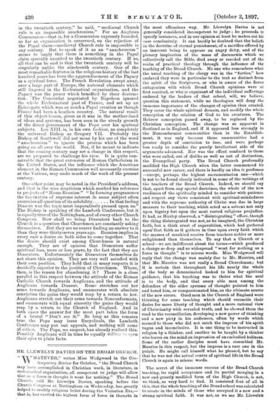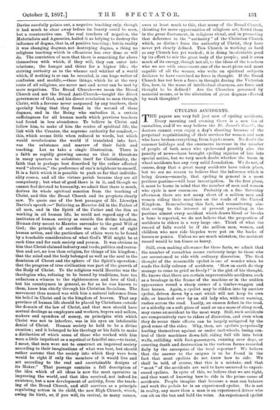MR. LLEWELYN DAVIES ON THE BROAD CHURCH.
" ANTHATEVER," writes Miss Wedgwood in the Con- temporary Review for October, " the Broad Church may have accomplished in Christian work, in literature, in ecclesiastical organisation, all competent to judge will allow that as a force in thought it went for nothing." The Broad Church, said Mr. Llewelyn Davies, speaking before the Church Congress at Nottingham on Wednesday, has greatly helped to modify religious belief during the Victorian Era,—
that is, has exerted the highest form of force in thought in
the most efficacious way. Mr. Llewelyn Davies in not generally considered incompetent to judge ; he proceeds tc specify instances, and in our opinion at least he makes out his case conclusively. It can hardly be doubted that the beliefs in the doctrine of eternal punishment, of a sacrifice offered by an innocent being to appease an angry deity, and of the plenary inspiration of the mass of documents which we collectively call the Bible, died away or receded out of the realm of practical theology through the influence of the teaching of the Broad Church. No one who remembers what the usual teaching of the clergy was in the "forties," how enslaved they were in particular to the text as distinct from the spirit of the Scriptures, or who is aware of the fierce antagonism with which Broad Church opinions were at first received, or who is cognisant of the individual sufferings endured by the leaders of that school, will, we believe, question this statement, while no theologian will deny the immense importance of the changes of opinion thus created. They cover the whole spiritual domain, and modify the whole conception of the relation of God to his creatures. The Hebrew conception passed away, to be replaced by the Christian conception. The change was as apparent in Scotland as in England, and if it appeared less strongly in the Nonconformist communities than in the Establish- ment, it was only because those communities had a greater depth of conviction to lose, and were perhaps less ready to consider the purely intellectual side of the arguments advanced. Nor was the effect confined to those who were called, out of dislike as well as out of distinction, the Evangelical party. The Broad Church profoundly modified the High Church when the latter commenced its successful new career, and there is hardly an idea it professes —except, perhaps, the highest saeramentarian one—which is not to be found clearly indicated in some of the writings of the teachers of the Broad Church. Indeed, we should say that, apart from any special doctrines, the whole of the new readiness of the spiritually minded to consider with patience and respect any views consistent with spiritual-mindedness and with the supreme authority of Christ was due in large measure to their teaching, which acted as a solvent not only upon bigotry but upon the most rooted religious prejudice. It had, as Huxley observed, a " disintegrating " effect, though the thing disintegrated was not, as he imagined, the Christian faith, but a thick crust of superstition, which had gathered upon'that faith as it gathers in time upon every faith which the masses of mankind receive from teachers nobler or more enlightened than themselves. To say that a Church or a school—we are indifferent about the terms—which produced a change so deep and so widespread " went for nothing as a force in thought" is to misuse words. Miss Wedgwood will reply that the change was mainly due to Mr. Maurice, and that Mr. Maurice was not really a Broad Churchman; but it is certain that throughout his life nearly the whole of the body so denominated looked to him for spiritual guidance, that his teaching was to theirs what the soul is to the body, and that every able man among the defenders of the older systems of thought pointed to him and hated him, or compassionated him, as the ultimate source of the new errors. Good men in the Church of England were thirsting for some teaching which should reconcile their desire for more liberty of thought and a more rational view of Christianity with revealed truth, and he showed them the road to the reconciliation, developing a new power of thinking and a. new piety in his audiences, often by words which seemed to those who did not catch the impress of his spirit vague and inconclusive. It is one thing to be instructed in religion by a thinker, and another to be taught by a thinker who leaves on the mind an impression of an embodied holiness. Some of the earlier disciples must have resembled Mr. Maurice in this respect, but the impress is a rare one in the pulpit. He might call himself what he pleased, but to say that he was not the actual centre of spiritual life in the Broad Church is again to misuse words.
The secret of the immense success of the Broad Church teaching, its rapid acceptance and its partial merging in a new and greatly modified form of the High Church, is not, we think, so very hard to find. It consisted first of all in this, that the whole teaching of the Broad school was calculated to create in the minds of those who accepted it a new and a strong spiritual faith. It was not, as we see Mr. Llewelyn
Davies carefully points out, a negative teaching only, though it had much to clear away before its beauty could be seen, bat a constructive one. The real teachers of negation, the Materialists and Agnostics, hailed it as helping to destroy the influence of dogma, that is, of positive teaching ; but in reality it was changing dogmas, not destroying dogma, a thing no religions teaching which is efficacious has ever done or will do. The conviction of men that there is something far above themselves with which, if they will, they can enter into relations; the hunger and thirst for a higher life ; the striving curiosity as to the whence and whither of a world which, if nothing is or can be revealed, is one huge welter of confusion and muddle,—these things, which lie at the very roots of all religions, are never met and never can be met by mere negations. The Broad Church—we mean the Broad Church and not the Broad Anti-Church—taught the direct government of God, and his direct revelation to man through Christ, with a fervour never surpassed by any teachers, their specialty being that they found in the second of these dogmas, and in the Being who embodies it, a certain sufficingness for all human needs which previous teachers had found in less abundance. To believe in Christ and follow him, to make of him the centre of spiritual life, the link with the Creator, the supreme authority for conduct,— this, which seems little when reduced to words, but which would revolutionise the world if translated into fact, was the substance and marrow of their faith and teaching. Let us take a single illustration. There is a faith so rapidly growing among us that it threatens in many quarters to substitute itself for Christianity, the faith that is perhaps beat described by the rather affected word "altruism," the preference of one's neighbour to oneself. It is a faith which it is possible to push so far that individu- ality ceases, and all the virtues perish because they are all compulsory ; but what of good there is in it, and though we cannot feel devoted to humanity, we admit that there is much, derives its whole spiritual sanction from the teaching of Christ, and this the Broad Church and its prophets clearly saw. To quote one of the best passages of Mr. Llewelyn Davies's speech :—" Believing as Maurice did in the Father of all men, and in the Spirit of the Father and the Son as working in all human life, he could not regard any of the institutes of human society as outside the divine kingdom. Human duty meant to Maurice surrender to the good Will of God; the principle of sacrifice was at the root of right human action, and the particulars of ethics were to be found by a teachable consideration of what God's Will might be at each time and for each society and person. It was obvious to him that Christ claimed industry and trade, politics and recrea- tion and art, no less than religion, for things of his kingdom ; that the mind and the body belonged as well as the soul to the dominion of Christ and the sphere of the Spirit's operation ; that the progress of true civilisation was part of the growth of the Body of Christ. To the religious world Maurice was the theologian who, refusing to be bound by traditions, bore too audacious a witness to the righteousness and love of God; but his countrymen in general, so far as he was known to them, knew him chiefly through his Christian Socialism. The movement thus named was with him a natural inference from his belief in Christ and in the kingdom of heaven. That any province of human life should be placed by Christians outside the domain of the law of Christ, and that men should have mutual dealings as employers and workers, buyers and sellers, makers and spenders of money, on principles with which Christ was not to interfere, was in his eyes an intolerable denial of Christ. Human society he held to be a divine creation ; and it belonged to his theology or his faith to make a distinction of which some of those who worked with him were a little impatient as a mystical or fanciful one,—to insist, I mean, that men were not to construct an improved society according to their imaginations of what was best, but should rather assume that the society into which they were born would be right if only the members of it would live and act according to the real and ascertainable designs of its Maker." That passage contains a full description of the idea which of all ideas is now the most operative in improving the world, and that idea received, not indeed its existence, but a new development of activity, from the teach- ing of the Broad Church, and still survives as a principle regulating action in its child, the new High Church, which, owing its birth, or, if you will, its revival, to many causes,
owes at least much to this, that many of the Broad Church, thirsting for more opportunities of religions act, found them in the great Sacrament, in religious ritual, and in promoting that deference to the " authority " of the Christian Church which, as distinct from the authority of Christ, they have never yet clearly defined. This Church is working as hard as any Church has yet worked ; it is doing incalculable good by its effort to stir the great body of the people ; and it owes much of its energy, though not all, to the ideas of the teachers who we see with amazement one of the most pious and most capable of all the women who write on spiritual subjects declares to have exercised no force in thought. If the Broad Church has not been a force in thought during the Victorian Era, how, in the name of intellectual clearness, are force and thought to be defined ? Are the Churches governed by material means, or is the alteration of great dogmas effected by weak thoughts ?







































 Previous page
Previous page